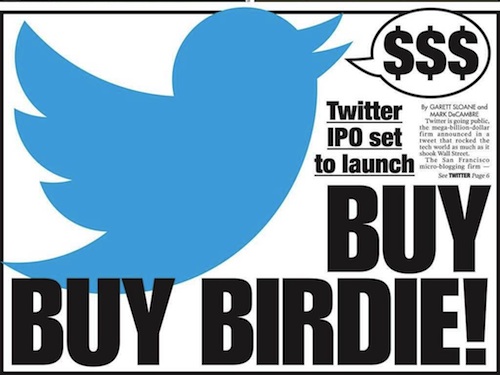Twitter turned eight last week, which prompted a rush of business/tech journalism on where it’s been and where it’s going. (This happened a few months back, when Facebook turned 10. Would third-grade human version of Twitter be friends with fifth-grade human version of Facebook? Probably not.) Twitter’s had an IPO between their 7th birthday and their 8th, so the game has changed a bit for them. You may have noticed similar changes in the Facebook central posting area — the News Feed — since their IPO (in fact, they’ve changed things up probably six times since their IPO). It’s much harder for a brand to resonate in that space without being creative about how they post, and I feel like every time I go to FB (which is less and less these days), the top six things are all Vine videos (or, videos in some context).
Here’s the issue for Twitter, though: even their CEO admits it can be “confusing” to some. When I try to explain Twitter to people who aren’t on it — like my parents, or in-laws, or others in that generational age range — they often flat-out don’t understand it. When I tried to explain it about 2-3 years ago to a friend my age, he said (pretty wisely), “That seems like something that only journalists, brands and maybe movie stars should be on.” The value of Twitter is that it’s the best — the best — place to get real-time and breaking news information. The problem is that you’re not necessarily connected to the other users — I can “follow” Katy Perry, but if she had a personal Facebook, she likely wouldn’t accept my friend request — and oftentimes, it can seem like a random stream of information, especially if you don’t necessarily curate your Twitter follows and timeline.
So what could they do in the next 2-3 years to maintain growth and please their shareholders? Well, there are a couple of ideas.
They do have a feature called the “Discover” tab, which is essentially more tailored tweets. They could make that the default when you log on, which would anger the hell out of brands/marketers/journalists/recruiters who want their tweeted-out content to be top of stream, and … essentially they’d be doing what Facebook did: trying to bring forward the “most quality” content to increase engagement and hopefully grow user base, ad revenue, etc. Remember: Twitter still has about 1/6th of the active users that Facebook does on a daily basis. It does need to consistently grow that user base, and a rambling run of content and inspirational sayings coming at middle-aged people in Oklahoma might not encourage them to join.
The broadly interesting thing here is that a company like Twitter actually needs to run away from the wants of the big companies/users on it in order to be successful; no one wants to see them prioritize an algorithm where you keep seeing tweets from General Mills. You’d get annoyed and leave, their user base would shrink, their value would shrink, and they’d become a business school case study in 10 years. The big users want one thing and Twitter needs another. It kind of goes back to the same broad idea with social media and marketing/corporations: even companies that do it very well and have robust social media teams don’t completely understand the inherent nature of the landscape. Companies/organizations flocked to Facebook, Twitter, etc. because people were there, so it seemed like a way to reach people. But just like you may tune out advertising via TiVo, so too has social media usage evolved that you can tune out ads and sponsor content. Most people I know go on Facebook for pictures and life updates, and go on Twitter for breaking news and to follow comedians/journalists. No one is going on there (that I know) to figure out the next Frito Lay product. So it’s a weird dance: the biggest users need something different (an algorithm that favors their content) than the provider (Twitter) should be creating, because they need to create engagement — and corporate content won’t necessarily do that. An awkward tango, to be sure.

I think the “journalists, brands and movie stars” line still applies insofar as it’s still for people looking to PRETEND they’re one of these things. The allure in reading a feed has always been discovery and the allure in tweeting has always been vanity. No one seems to be good at tailoring and monetizing the former and any threat to the latter will be deadly. In other words I can see why people can’t see much of a way forward for them.